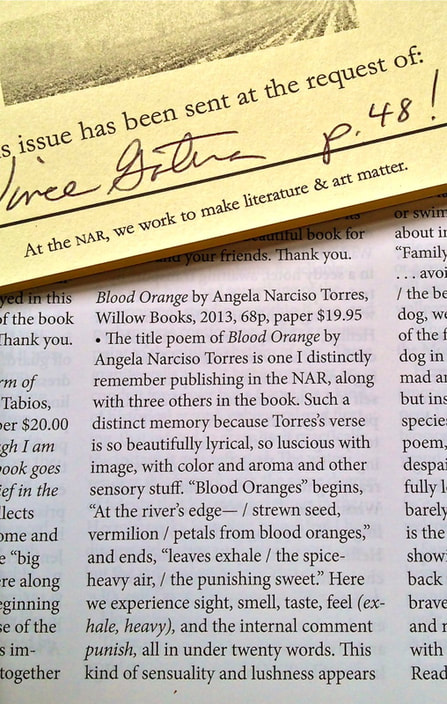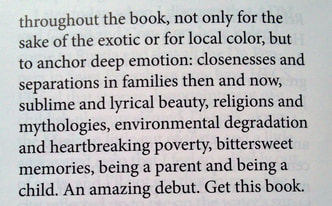reviews.
To the Bone
The Night Heron Barks
Cleaver Magazine
Libromobile
Blood Orange
American Microreviews and Reviews
POETRY
Philippine Star
All Pinay Everything
FILIPINA AMERICAN LITERATURE
To the Bone
The Night Heron Barks
Cleaver Magazine
Libromobile
Blood Orange
American Microreviews and Reviews
POETRY
Philippine Star
All Pinay Everything
FILIPINA AMERICAN LITERATURE
North American Review
Hangman Books
"Many poets refract the family through bifocal lenses of past and future, but few do so with the graceful precision and careful reverence of Angela Narciso Torres’s excellent first collection of poetry. Torres bears genealogical witness to motherhood and daughterhood, family and gender roles with the cultivated abundance of a pristine archive or well-pruned mango grove, illuminated by fire trees and red moons, burnt cartography and Spanish ruins. Blood Orange weds references to Catholic sacraments and Filipino foodstuffs, to memories of Manila and postcards from Bohol, peppered with local names for flowering fruit trees, like siniguelas, guava, and caimito. The book’s simultaneously retro- and introspective structure allows the speaker to appraise a geographically-displaced childhood while raising children of her own. Often, this dual focus manifests through evocative use of the body. In the last stanzas of “Menarche,” for instance, the speaker’s mother explains how the Virgin Mary slaked the Christ child’s thirst with water from the tart lanzone, a fruit grown in the Philippines:
Dividing the flesh like a flower, five crescents
eclipsing the ghosts of pips, she points to
Mary’s imprint on each segment, faint as a line
on her open palm. I choose from the basket,
this one, perfect, round, topped with
a small dark star, aureole of a nursing breast."
-Diego Baez, reviewing Blood Orange for H_NGM_N Books
"Many poets refract the family through bifocal lenses of past and future, but few do so with the graceful precision and careful reverence of Angela Narciso Torres’s excellent first collection of poetry. Torres bears genealogical witness to motherhood and daughterhood, family and gender roles with the cultivated abundance of a pristine archive or well-pruned mango grove, illuminated by fire trees and red moons, burnt cartography and Spanish ruins. Blood Orange weds references to Catholic sacraments and Filipino foodstuffs, to memories of Manila and postcards from Bohol, peppered with local names for flowering fruit trees, like siniguelas, guava, and caimito. The book’s simultaneously retro- and introspective structure allows the speaker to appraise a geographically-displaced childhood while raising children of her own. Often, this dual focus manifests through evocative use of the body. In the last stanzas of “Menarche,” for instance, the speaker’s mother explains how the Virgin Mary slaked the Christ child’s thirst with water from the tart lanzone, a fruit grown in the Philippines:
Dividing the flesh like a flower, five crescents
eclipsing the ghosts of pips, she points to
Mary’s imprint on each segment, faint as a line
on her open palm. I choose from the basket,
this one, perfect, round, topped with
a small dark star, aureole of a nursing breast."
-Diego Baez, reviewing Blood Orange for H_NGM_N Books
Donna Miscolta, author of "When the De la Cruz Family Danced."
Torres’s poems in this collection deal with the elusive and the
ephemeral—fleeting moments of connection that are shared and repeated among
generations of a family. She describes the difficulty of letting go in “Lucky,”
and the necessity of letting go in “Elegy with Roller Skates.” And then there is
the impossibility of hanging on in “Thursday, After Dinner at L’amie Donia:
…starting/ at the beginning doesn’t help me to remember.
In “Waiting for my Father,” a girl reflects on her place in the larger world and
also her place in her father’s world as she waits for him to finish his work in
a hospital lab that houses among other things, specimens of a human fetus and a
microscope that reveals a hidden and complex universe of life, illness, and
death. Torres’s language is clean and fluid, the better to make her images shimmer.
In the three short poems from “Postcards from Bohol,” Torres animates
postcard perfect images that poke a hole in your heart with a simple, telling
movement such as when “small crabs/fine-pencil disappearing tracks” or when a
starfish is abandoned by the tide “we huddle around him/our cheeks flushed with
twilight.”
Torres’s poems in this collection deal with the elusive and the
ephemeral—fleeting moments of connection that are shared and repeated among
generations of a family. She describes the difficulty of letting go in “Lucky,”
and the necessity of letting go in “Elegy with Roller Skates.” And then there is
the impossibility of hanging on in “Thursday, After Dinner at L’amie Donia:
…starting/ at the beginning doesn’t help me to remember.
In “Waiting for my Father,” a girl reflects on her place in the larger world and
also her place in her father’s world as she waits for him to finish his work in
a hospital lab that houses among other things, specimens of a human fetus and a
microscope that reveals a hidden and complex universe of life, illness, and
death. Torres’s language is clean and fluid, the better to make her images shimmer.
In the three short poems from “Postcards from Bohol,” Torres animates
postcard perfect images that poke a hole in your heart with a simple, telling
movement such as when “small crabs/fine-pencil disappearing tracks” or when a
starfish is abandoned by the tide “we huddle around him/our cheeks flushed with
twilight.”


